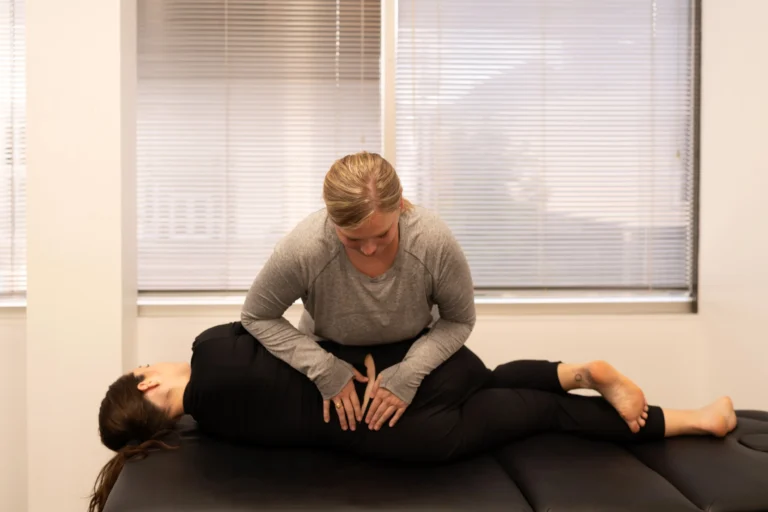As Dr. Elizabeth Ngutse, I frequently encounter a common, often unconscious, habit among my patients: “ab gripping.” This term refers to the subtle, yet consistent, tensing or “sucking in” of the abdominal muscles. Many individuals aren’t even aware they’re doing it until prompted to truly relax or take a deep breath, at which point they might notice an unexpected difficulty.
This often-subconscious habit can develop for various reasons, yet it can significantly contribute to a range of undesirable symptoms. At Ares Physical Therapy, proudly serving the communities of Waukesha, Brookfield, Pewaukee, and New Berlin, WI, we are dedicated to helping you understand why this occurs, the importance of addressing it, and practical strategies to release this tension and restore optimal function.
Identifying Abdominal Gripping: Does This Sound Like You?
Recognizing if you’re an “ab gripper” is the first step toward resolution. Here are several common scenarios and characteristics we observe in individuals who have developed this habit:
- Athletes in Aesthetic Sports: Dancers, figure skaters, and gymnasts, where body lines and appearance are integral to performance, may unconsciously grip their abdominals.
- Influence of Beauty Standards: Individuals, regardless of gender, who feel pressure to conform to “ideal” body standards often perpetuated by media, may resort to habitual abdominal tension.
- Stress and Anxiety: Abdominal gripping frequently coexists with shallow breathing or breath-holding patterns, indicating a physiological response to heightened stress or anxiety.
- Digestive Discomfort and Body Image: Those experiencing bloating or other digestive issues may subconsciously tense their abdomen to alter its appearance.
- Postpartum Women: After pregnancy, women seeking to reconnect with their core or reduce the visual size of their belly can inadvertently develop a gripping habit rather than healthy core activation.
- Chronic Back Pain: Individuals advised to “activate their core” consistently for persistent back pain may, unintentionally, develop a pattern of gripping instead of balanced core engagement.
- Restrictive Clothing: Wearing tight clothing that offers minimal stretch can encourage the habit of sucking in the abdomen to fit comfortably.
The Importance of Releasing Abdominal Tension: Why You Should Stop Gripping
At Ares Physical Therapy, we emphasize that constant abdominal gripping is more than just a minor habit; it has significant implications for your health and well-being. Here are five crucial reasons why addressing this habit is essential:
- Disruption of Muscle Work-Rest Cycles: Your superficial abdominal muscles are not designed for continuous contraction. Sustained gripping prevents these muscles from undergoing their necessary work-rest cycles, potentially leading to fatigue and dysfunction.
- Impaired Diaphragmatic Breathing: Abdominal gripping severely restricts the natural movement of your diaphragm, making deep, diaphragmatic breathing nearly impossible. This limits oxygen intake and prevents you from experiencing the numerous benefits of proper respiratory function, such as reduced stress and improved systemic oxygenation.
- Increased Intra-Abdominal Pressure: Continuous gripping elevates pressure within your abdominal cavity. This increased intra-abdominal pressure can contribute to or exacerbate conditions affecting your bladder, pelvic floor, and potentially lead to issues such as pelvic organ prolapse, hernias, or spinal disc herniations.
- Correlation with Pelvic Floor Dysfunction: Abdominal gripping is often linked to co-contraction or “gripping” of the pelvic floor muscles. This can result in an overactive pelvic floor, manifesting in symptoms like painful intercourse or increased bladder urgency and frequency.
- Exacerbation of Digestive Symptoms: Paradoxically, constantly tensing your abdomen can worsen symptoms of digestive discomfort by impeding the natural movement and function of your digestive organs.
Strategies for Releasing Abdominal Tension: Your Path to Relief
Breaking established habits requires conscious effort, but it is entirely achievable. If you identify as an “ab gripper,” please know that this is a common issue, and effective strategies exist to help you.
The foundational step is awareness. Begin by simply noticing moments throughout your day when you are tensing your abdomen. Consciously think about relaxing and releasing this tension.
Next, practice allowing your belly to soften as much as possible. Then, maintain this softness for five deep breaths. As you inhale, observe your belly naturally expanding outwards without any forced effort or “sucking in.”
One of the most effective positions to initiate this practice is on your hands and knees, where gravity can assist the natural expansion of your abdomen. From this position, allow your belly button to gently move closer to the floor with each inhalation. This exercise is an excellent way to provide your abdominal muscles with a vital rest throughout your day.
As you become more comfortable, gradually incorporate deep breathing and conscious abdominal release into various positions – lying down, sitting, standing, and even while walking.
Partnering with Ares Physical Therapy for Lasting Relief
If you are experiencing symptoms associated with abdominal gripping, a professional evaluation can provide significant benefits. At Ares Physical Therapy, we specialize in identifying the underlying causes of musculoskeletal imbalances, including those contributing to abdominal gripping. Our expert physical therapists create individualized treatment plans focused on restoring optimal breathing mechanics, balanced core function, and pelvic floor health.
Ares Physical Therapy is uniquely equipped to guide residents of Pewaukee, Waukesha, Brookfield, and New Berlin, WI, toward lasting relief and improved functional movement. We conduct thorough assessments to pinpoint the root of your gripping habit and provide evidence-based exercises and techniques that promote genuine core stability and relaxation.
Don’t let the unconscious habit of abdominal gripping impact your comfort and health. Contact Ares Physical Therapy today to schedule your consultation and begin your journey toward a more relaxed, functional, and healthier you.




